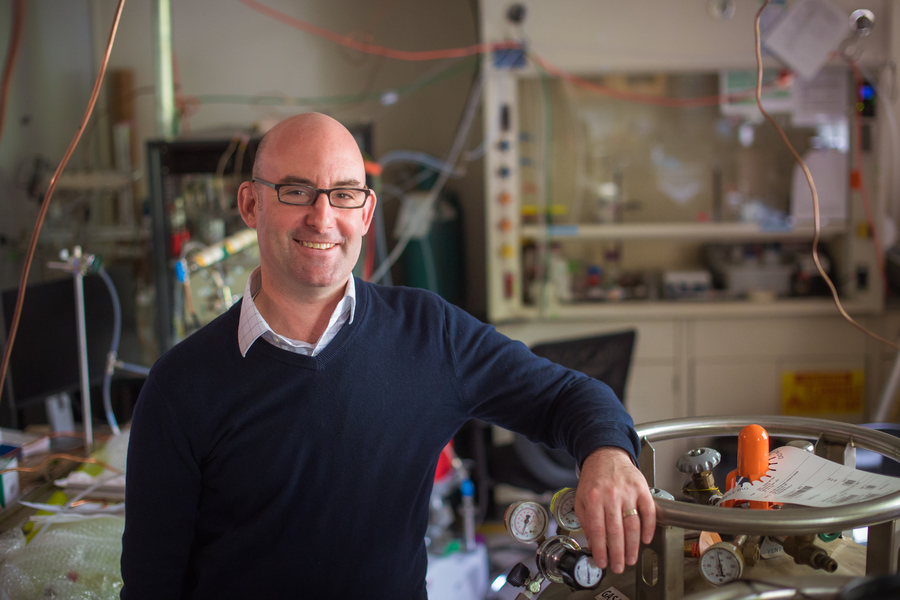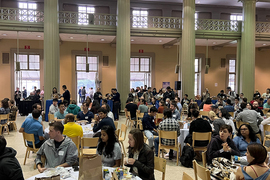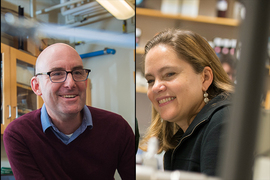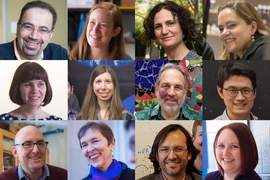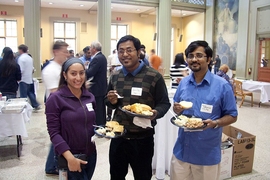The MIT Postdoctoral Association (PDA) has dedicated its second annual Award for Excellence in Postdoctoral Mentoring to Jesse Kroll. Professor of civil and environmental engineering, professor of chemical engineering, and director of the Ralph M. Parsons Laboratory, Kroll was nominated by current and former postdocs for his commitment to fostering an inclusive environment and supporting postdocs’ advancement in both research and professional development.
“The award exists to recognize the most outstanding mentors within the MIT faculty,” says Jonathan Cottet, a senior postdoc and past vice president of the MIT Postdoctoral Association, who presented it to Kroll on behalf of the PDA. “It’s also about highlighting the fundamental importance of mentoring postdoctoral scholars, who are poised to become the next generation of academic and scientific leaders. Faculty play a crucial role in postdocs’ academic and career development.”
The award recipient is announced each September at a lunch hosted by the Office of the Vice President for Research in recognition of National Postdoc Appreciation Week. Hundreds of postdocs gather for the annual luncheon along with faculty and deans to celebrate the postdoctoral community and its contributions to MIT research excellence.
The nomination letters praised Kroll’s caring and inclusive management style as well as his attentive approach to supporting postdocs’ goals in both research and professional development. Holding weekly meetings with trainees, the letters said, Kroll has taken time to discuss career development, grant proposals, group funding and budgeting, hiring considerations, collaborations, and job application packages. “It is because of these meetings that I feel prepared to start my own group,” one nominator wrote.
Another nominator, who has continued to benefit from Kroll’s advice and support since leaving the lab for a faculty position, commented, “I could not have asked for a more supportive, open, or knowledgeable mentor to advise me throughout my academic career.”
Kroll’s lab conducts experimental studies to better understand Earth’s atmospheric chemistry. By characterizing the properties and chemical transformations of organic species, his research team examines how organics affect air quality and climate.
“What's most important and most rewarding about mentoring postdocs is sharing in the ownership and direction of the research,” says Kroll. “Obviously, the postdoc is the one really doing the work and driving the whole effort, defining the key questions and next steps. But at the same time this isn't done in isolation. So the mentor's job isn't just to advise on the progress of the research; it's also to help think about how it connects to, or even expands on, the broader goals of the research program — and not just the PI's current one, but also the postdoc's future one.”
“This shared sense of purpose — which is also about the postdoc getting the job they want afterwards! — is for me the most meaningful and fun aspect of working with postdocs,” Kroll says.
Recipients of the Award for Excellence in Postdoctoral Mentoring are selected, with input from the Faculty Postdoctoral Advisory Committee, on the basis of four criteria:
- excellence in fostering and encouraging professional skills development and growth toward independence;
- ability to foster an inclusive work environment where postdoctoral mentees across a diversity of backgrounds and perspectives are empowered to engage in the mentee-mentor relationship;
- ability to support postdoctoral mentees in their pursuit of a chosen career path; and
- a commitment to a continued professional mentoring relationship with mentees, beyond the limit of the postdoctoral term.
Notably, one-third of the nomination letters this year were submitted by former postdocs, reflecting the lasting influence of mentors who set them on a path to success.
“One of the great pleasures of my tenure as vice president for research has been the collaborative relationship with the Postdoc Association to improve the postdoc experience at MIT,” says Maria T. Zuber, vice president for research, who supported the award’s creation last year, along with Ann Skoczenski, director of MIT Postdoctoral Services. “Successive groups of PDA leaders have met the challenges of the past few years with the creation of programs and initiatives that build community and help postdocs navigate MIT.”
The Award for Excellence in Postdoctoral Mentoring provides a celebratory lunch for the recipient’s research group, as well as the opportunity to deliver a seminar on the topic of mentoring for the postdoctoral community. Last year’s award went to Muriel Médard, NEC Professor of Software Science and Engineering in the Department of Electrical Engineering and Computer Science.
